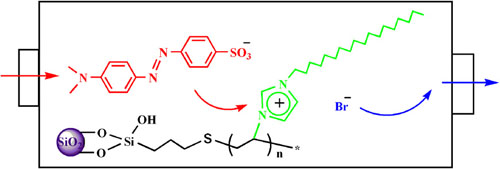Researchers at Kumamoto University and Lanzhou Institute of Chemical Physics (LICP), Chinese Academy of Sciences (CAS), have used in situ anion-exchange as a new self-assembly strategy to tune the counter anions of poly(octadecylimidazolium)-grafted silica column. The retention mode was evaluated by the separation of a Tanaka test mixture and the retention studies using alkylbenzenes and PAHs.
 |
|
Scheme of in situ anion-exchange reaction happened in poly(octadecylimidazolium)-grafted silica column. |
Compared with commonly used commercial octadecyl columns, poly(octadecylimidazolium) columns not only have an octadecyl chain, but also contain functionalized imidazolium groups to impart additional interactions such as –and hydrogen-bonding interactions to the analytes. After bromide was replaced by methyl orange in the column, enhanced molecular shape selectivity was confirmed by separations of SRM 869b and SRM 1647e. In situ anion-exchange could also be used as a new method for synthesizing other ionic columns to modify the surface of the stationary phase and tune the chromatographic performance.
The work has received support from the Japan Society for the Promotion of Science (JSPS), National Natural Science Foundation of China and a Grant-in-Aid for Scientific Research from the Ministry of Education, Culture, Sports, Science, and Technology of Japan.
The findings have been published in Journal of Chromatography A(Journal of Chromatography A, 1232 (2012) 116– 122).


